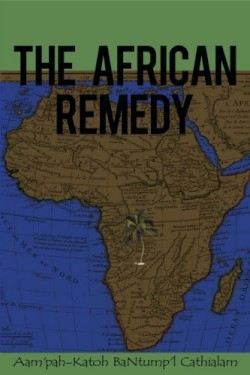The African Remedy
Cathialam sees that there are serious problems in today’s black communities—in America and in Africa itself. In The African Remedy he touches on a number of these issues from issues with hair to the corruption in African government. Many of these problems he believes relate to an “inferiority complex” that has been passed through generations of Africans and Black Americans—a condition that many suffer from without knowing it. The author believes he has the solution; unfortunately he fails to convey his message in a convincing manner in this book which is written in a rambling stream-of-consciousness style.
Part one of the book is devoted to a discussion of treatments that relax kinky hair and lighten skin tone and the author’s observation that most African public figures marry women with light skin. He uses examples to illustrate his points without taking the time to give specific details that would help readers along: “There is a respectable basketball analyst who used to keep a nice Afro one day he came on television with an absolute new look” he writes without naming the celebrity.
In part two Cathialam focuses on Africa and repeats statistics and “facts” without citing sources leading readers to wonder where he got his information. He claims that for centuries doctors in the region of Guinea-Bissau were on the forefront of modern medicine: “All ailments known as well as foreign were diagnosed then cured. There were no physical handicaps and there were no amputations.” This is an impressive statistic but it is hard to swallow without a study to back up the author’s claim.
“At the end of the day the black man must regain self-respect before expecting or demanding respect from others” the author writes. This is the heart of Cathialam’s message. The widespread inferiority complex he says has resulted in the loss of African languages leading to a loss of cultural identity: “Everything is now being considered and analyzed under a foreign angle since you’re now thinking and reasoning in a foreign language.” He suggests that a move back to African languages and dress as well asmove away from capitalism—a system that is incongruent with African tradition—would help reduce corruption and loss of identity in Africa.
The author taught himself English which is an impressive accomplishment but his book contains many grammatical errors misspellings and slip-ups that are common to non-native speakers and that detract from Cathialam’s message.
Cathialam was born in Africa and has spent time in various parts of the United States; he undoubtedly has a unique perspective on the issues facing the Black community but his solutions would be taken more seriously if they were presented with less anecdotal evidence fewer of the generalizations and subjective political opinions that populate the last third of the book and with more careful research and cited sources.
Reviewed by
Whitney Hallberg
Disclosure: This article is not an endorsement, but a review. The publisher of this book provided free copies of the book and paid a small fee to have their book reviewed by a professional reviewer. Foreword Reviews and Clarion Reviews make no guarantee that the publisher will receive a positive review. Foreword Magazine, Inc. is disclosing this in accordance with the Federal Trade Commission’s 16 CFR, Part 255.

